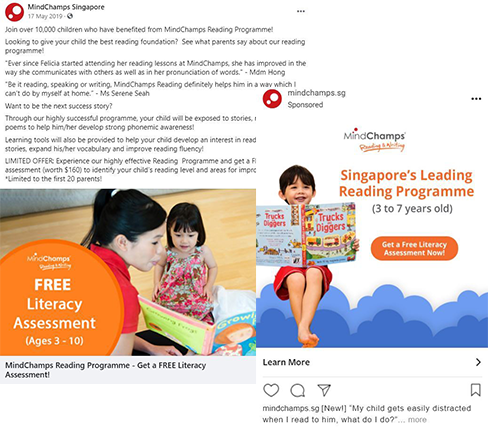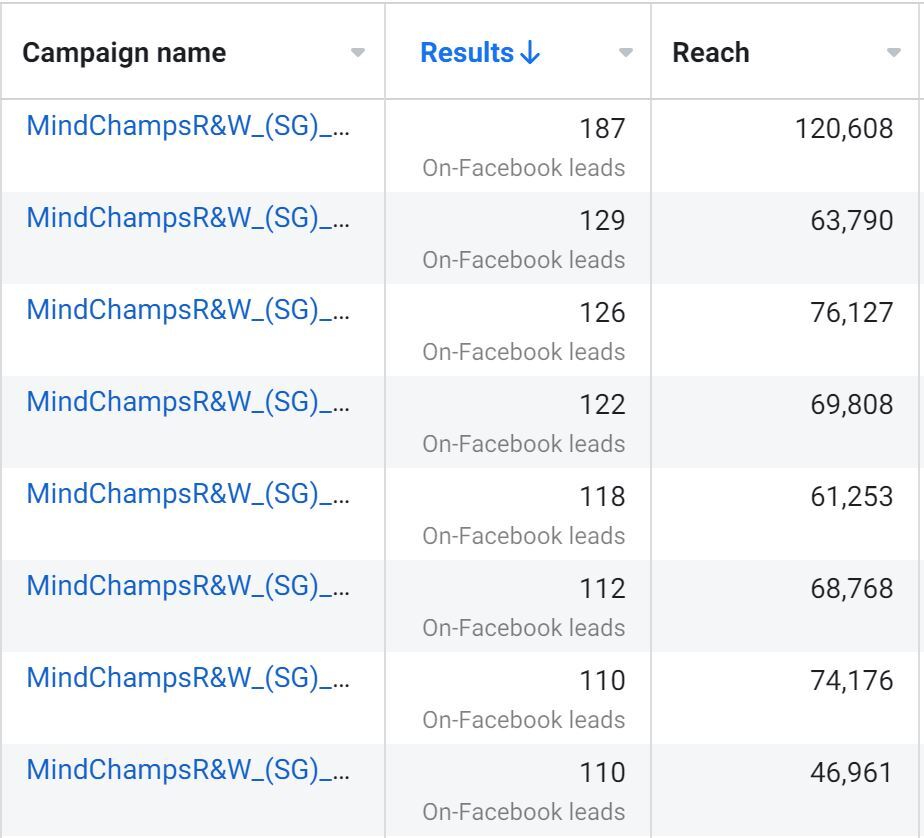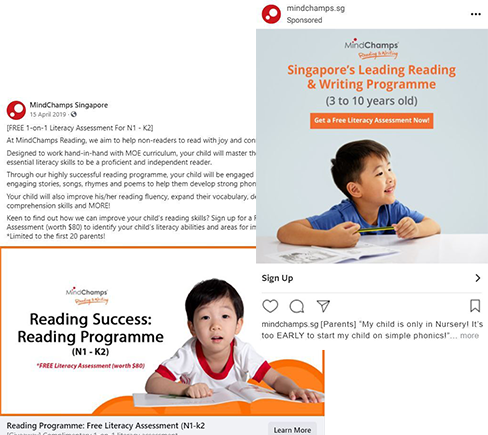
MindChamps is Singapore's premium early childhood education provider that offers bilingual academic and enrichment programmes for children from 18 months to 6 years old, in the playgroup, nursery and kindergarten levels.
One of the major factors that have contributed to the continued success of MindChamps’ SEM campaigns is the fact that we have been running their campaigns from year to year. Armed with the data collected over an extended period of time, we know what works and leverage that to improve the results for the next campaign.
This is demonstrated by how we increased their leads by 40.6% and reduced their CPA by 6.17% from 2018 to 2019.
How do we do it? Here’s one example of how we used this data to improve the campaign.
With 39 locations island wide, MindChamps Preschool runs ads to get parents to visit the centre for a school tour. This school tour allows parents to view the ongoing classes and the children in action at a centre that is nearest to their home.
Thus, location-based keyword targeting is a key component of the campaign as most parents would search for a centre near their home e.g. if they live in the Punggol area, they would use words like ‘preschool near punggol’ while doing their online search.
In the previous campaign, we sorted the location-based keywords into ad groups based on North, South, East and West areas of Singapore.
After getting data from the campaign, we realised that certain ad groups performed much better than others.

Hence, we performed a restructure of our location-based keywords. Instead of housing the ad groups into a campaign based on their area (East, West, North, South, etc), we regrouped them according to lead volume and CPA.
In other words, ad groups that performed a lot better like Punggol, Yishun, and Tampines are housed together after this restructure.
This restructure was only possible as we managed to gather a lot of data for the various keywords so that we could group them accurately based on their performance.
Doing this gave us finer control over the budget and bids for top performing keywords. It also ensured that underperforming keywords do not affect the performing keywords by being housed together.

How do we do it? Here’s one example of how we used this data to improve the campaign.
With 39 locations island wide, MindChamps Preschool runs ads to get parents to visit the centre for a school tour. This school tour allows parents to view the ongoing classes and the children in action at a centre that is nearest to their home.
Thus, location-based keyword targeting is a key component of the campaign as most parents would search for a centre near their home e.g. if they live in the Punggol area, they would use words like ‘preschool near punggol’ while doing their online search.
In the previous campaign, we sorted the location-based keywords into ad groups based on North, South, East and West areas of Singapore.
After getting data from the campaign, we realised that certain ad groups performed much better than others.
Hence, we performed a restructure of our location-based keywords. Instead of housing the ad groups into a campaign based on their area (East, West, North, South, etc), we regrouped them according to lead volume and CPA.
In other words, ad groups that performed a lot better like Punggol, Yishun, and Tampines are housed together after this restructure.
This restructure was only possible as we managed to gather a lot of data for the various keywords so that we could group them accurately based on their performance.
Doing this gave us finer control over the budget and bids for top performing keywords. It also ensured that underperforming keywords do not affect the performing keywords by being housed together.
MindChamps ‘Reading and Writing’

One of the divisions in MindChamps is called ‘Reading and Writing’ which targets parents who want their young children to get a head start in their reading and writing abilities.
Initially, their CTA was a generic one like ‘Enquire now’. However, this was not effective as the education space in Singapore is very competitive.
Having a weak and generic CTA was not desirable as it does not provide value to the parents as opposed to a 1-1 literacy assessment which can provide them with real value.

Hence, we suggested to market their free 1 on 1 literacy assessment instead for children aged 4 – 10 (N1 to P4), and the response was excellent.
Why? It’s all about the parents’ intention. It gives them an on-site experience about the programme and it’s more personalized as compared to just a generic online enquiry.
Through the literacy assessment, parents would uncover their child’s reading and writing gaps, level and areas for improvement.
The results of the literacy assessment would then set the context for the parent to consider enrolling their child in MindChamps’ programmes.
A key advantage of using Facebook Marketing to drive sign-ups for MindChamps’ free literacy assessment is that Facebook Marketing is able to target parents who do not know about the free assessment.
If we were to run a pay-per-click campaign with keywords, it would not be able to reach these parents as they are not even searching for it. With Facebook Marketing, we were able to reach parents who do not know about MindChamps’ free assessment and hence increase the pool of potential leads.
With this Facebook Marketing campaign, a challenge we had to overcome was ad fatigue. Ad fatigue is a problem that affects even the most successful Facebook ad campaigns and happens when the campaign frequency gets too high.
The target audience sees the same ads again and again, grow tired of them (fatigue) and therefore become less responsive to them.
To combat ad fatigue, we
- reduced the length of the ad copy
- changed the headers for some ads
- replaced the banner (this refers to the visual that accompanies the text)
- used a mix of advertorial and non-advertorial style visuals


A key advantage of using Facebook Marketing to drive sign-ups for MindChamps’ free literacy assessment is that Facebook Marketing is able to target parents who do not know about the free assessment.
If we were to run a pay-per-click campaign with keywords, it would not be able to reach these parents as they are not even searching for it. With Facebook Marketing, we were able to reach parents who do not know about MindChamps’ free assessment and hence increase the pool of potential leads.
With this Facebook Marketing campaign, a challenge we had to overcome was ad fatigue. Ad fatigue is a problem that affects even the most successful Facebook ad campaigns and happens when the campaign frequency gets too high.
The target audience sees the same ads again and again, grow tired of them (fatigue) and therefore become less responsive to them.
To combat ad fatigue, we
- reduced the length of the ad copy
- changed the headers for some ads
- replaced the banner (this refers to the visual that accompanies the text)
- used a mix of advertorial and non-advertorial style visuals
Using these optimisation tactics, we managed to acquire the leads at a lower cost.

Most importantly, we were able to track the top performing ads and use objective data to improve the rest of the ads. This contributed to the success of this campaign for MindChamps.